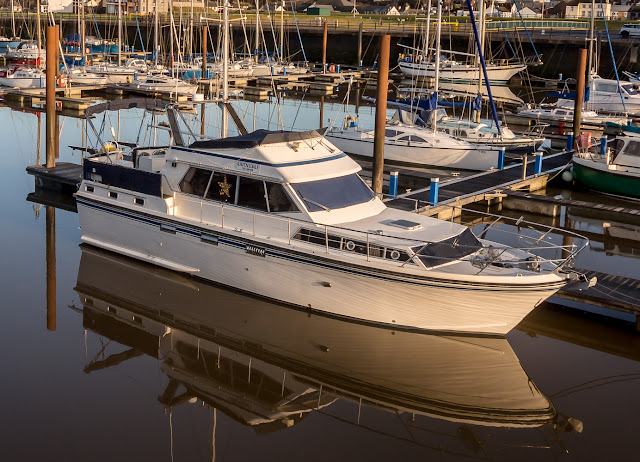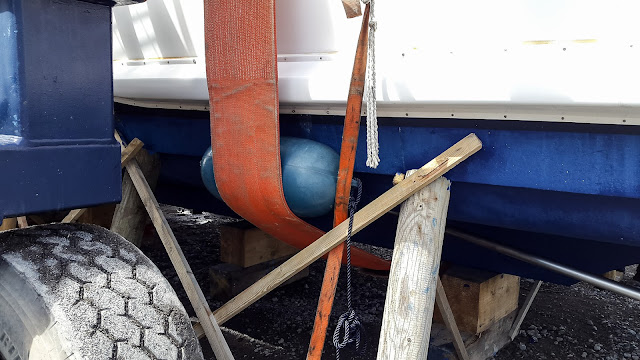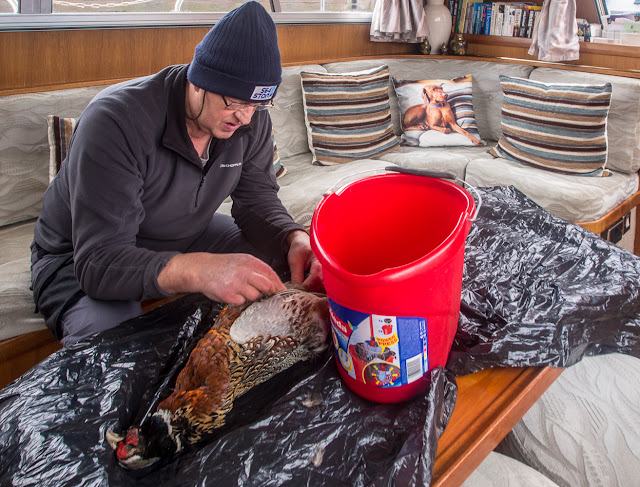 |
Ravensdale in the boat hoist the last time she came out of the water |
The response to our first request for help on Facebook far exceeded our expectations.
And advice from around the world led to a solution right on our doorstep - OK, on our pontoon, but it’s the same thing J
I posted a request for guidance on how to overcome the problem we face every time our 43ft cruiser Ravensdale is lifted into or out of the water on two Facebook groups for liveaboards.
The design of the Neptunus 133, with fibreglass exhaust outlets running along the outside of the hull, means they get damaged by the slings on the boat hoist.
 |
Ravensdale's starboard side showing one of the problem exhaust outlets |
We had her lifted out for a survey before we bought her in October 2016 and put back in the water at the start of November of the same year when we moved on board.
On these occasions, both outlets lifted, damaging the screws and breaking the sealant along the top edge on the port side, which we repaired.
The next time she was lifted was last spring, when we had her out on the hard-standing for antifouling, to replace the anodes and for other work that could only be carried out while she was out of the water.
This time, the exhaust outlet on the starboard side snapped in half and the port side lifted again.
While she was out of the water, Phil repaired the broken side and we replaced the screws that had become damaged on both sides.
Lifting her back in was a big worry as we really didn’t want it to happen again.
The marina’s boat lift should be up to the task as Ravensdale is only 16 tonnes and the lift is designed to take up to 25 tonnes.
 |
The problem lift point with one of the wooden blocks we tried last time |
Phil and one of the marina staff built some wooden blocks that we hoped would do the job, but they snapped as soon as the slings took the strain so we ended up having to place fenders under the exhaust outlets again.
 |
The marina's fender solution |
And, once again, the fenders lifted when the slings pulled up underneath them and lifted the exhaust outlets.
Thankfully, they didn’t break the outlets this time, but again the screws were bent and the exhaust began escaping around the screw holes.
 |
One of the drawings sent by a Facebook group member |
Last week, I explained our problem and posted photos of the things we’d tried, without success, on Facebook and asked if anyone had any better ideas before her next lift out – possibly in the spring.
And we were totally overwhelmed by the response.
Within hours of posting my request, I received literally dozens of suggestions from people all over the world and all but a handful were extremely helpful (the others I just ignored J)
The many good ideas ranged from making larger wooden blocks and using hardwood for a similar design of block to moving to a marina with a wider boat lift.
 |
Another drawing from the same person |
I made it clear that we liked our current marina at Maryport, Cumbria, UK, so needed to find a solution that would work for us here.
Other members of these groups posted photos and videos of the equipment they used or had seen used with boats of a similar design.
And a few kind people posted or sent me drawings of their suggested solutions. One also provided all the details on the grade of steel, etc, that was needed.
Our plan was to take this information to a local fabrication yard to see if they could build something to do the job.
We'd recently become aware that another berth holder here, Stuart Norton, whose boat is moored on the same pontoon as us, was some sort of engineering designer.
He had just designed a piece of kit for another boat owner here, so I asked if he could suggest someone to do the welding work.
 |
Stuart Norton's initial design |
Stuart immediately volunteered to take a look at it for us.
I emailed him the information and drawings I’d been sent on Facebook and he came up with what looked like a workable solution constructed from 6mm steel, with each one weighing 20kg.
The steel bridges include holes to take lines so they don't get dropped in the water, and Stuart is suggesting 10mm neoprene, or similar material, on the pads to protect the hull.
He brought a special tool along to measure the angles involved to ensure a snug fit.
As Ravensdale is in the water at the moment, this involved crawling around on the pontoon and trying to make sure it was fitting correctly under the water.
 |
Phil watching Stuart measure the angle |
To help with this project, I offered to send Stuart photographs of the relevant parts of Ravensdale when she was out of the water.
He also took a series of photographs with a tape measure in shot so the software he uses can make the necessary calculations.
Having taken the measurements, he has gone away to tweak his design and to get us a quote for the work, which he would also commission and oversee for us.
We’re well aware that it’s not going to be cheap – after all nothing is ever cheap where boats are concerned J
However, if it solves the problem, it will be money well spent.
Once we have his final design, we will check whether the marina foreman thinks the steel bridges will work and is happy to use them before getting them made up.
Meanwhile, we had a lovely surprise last week when we were given a brace of pheasants.
 |
Phil with the brace of pheasants |
I have to confess that there is no way I could have dealt with them as I’m a bit squeamish about raw meat at the best of times, but Phil was happy to take them on.
As there wasn’t really room to deal with them in the galley, he split open a black bin liner and laid it across the coffee table in the saloon.
I had visions of the boat filling up with feathers while he was plucking them, but he managed to keep most of the flying feathers under control and only a few downy bits of plumage found their way into the rest of the boat.
Thankfully, he took the birds out onto the aft deck to gut them and he hoovered up the feathers in the saloon as soon as he’d finished.
The pheasants provided two meals – the first night we had one roasted with bacon on it, served with cider, celery and onion sauce and roast vegetables.
And the second one was casseroled with root vegetables in the remaining cider and served with mashed potato and cabbage.
Both meals were delicious.
 |
The pheasant plucker at work |
 |
Oven ready pheasant |
Not such a pleasant surprise was catching the flu that has left me feeling rotten for the whole of the past week. In fact, I don’t feel any better yet so really hoping it will clear soon.
And we’ve had a couple of very cold nights when the water in the marina froze over and Phil spread salt on our pontoon so we could get up to facilities safely.
 |
Phil salting the pontoon that leads to Ravensdale |
I have to say going up to use the marina toilets and showers when feeling so unwell has not been the best experience, but I know it won’t be long before I’m feeling better again.
 |
Russell hoobs - the new name on our freezer |
And finally, I thought you might be amused by the logo on our freezer.
It reads “Russell hoobs”
I couldn’t help thinking it sounded like a bad knock-off version of a Russell Hobbs freezer, but I knew we’d bought a genuine Russell Hobbs so I took a closer look.It turned out that the straps we put around the freezer to stop it sliding when we take Ravensdale out to sea had knocked off part of the letters.
 |
The microwave and freezer strapped down for going out to sea |
So it really was “knock off” but not in the way I first thought J
I have no idea why I did this, but I decided to Google “Russell hoobs” and was amazed to get pages of results.
It’s obviously a common misspelling of the brand as the search engine directed me to results for Russell hoobs, but clicking on any of the links took me to Russell Hobbs products. Who’d have guessed? J